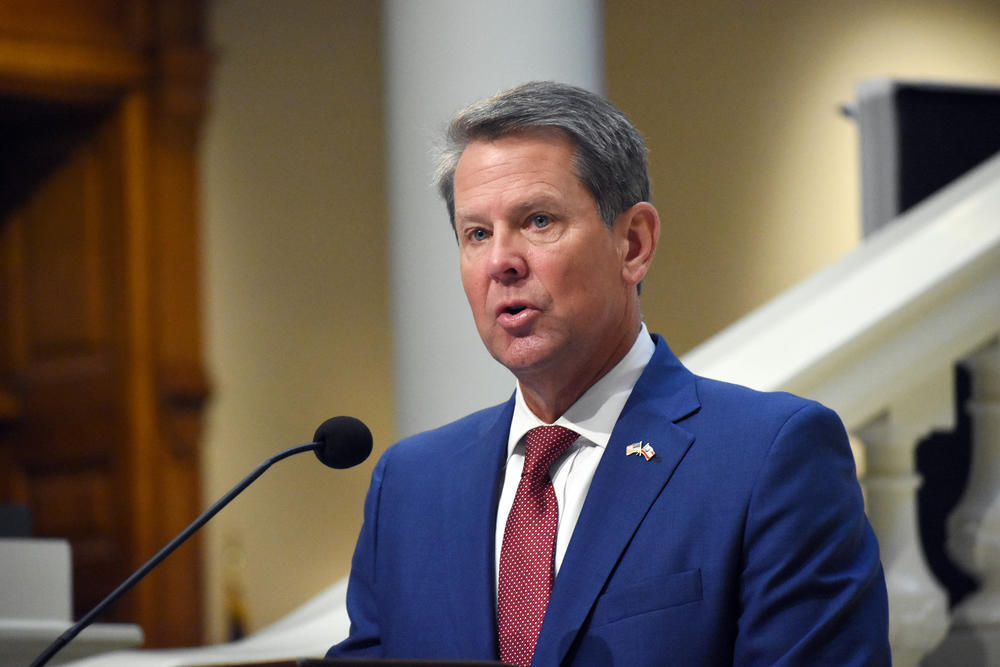
Caption
Term-limited Gov. Brian Kemp, seen here in a 2020 press conference, has opted not to pursue a rumored U.S. Senate bid in 2026.
LISTEN: Gov. Brian Kemp announced Monday that he will not make a run for the U.S. Senate in 2026, setting off what's likely to be a competitive Republican race to take on incumbent Sen. Jon Ossoff, a Democrat. GPB's Orlando Montoya speaks with longtime Georgia political strategist and commentator Bill Crane about it.

Term-limited Gov. Brian Kemp, seen here in a 2020 press conference, has opted not to pursue a rumored U.S. Senate bid in 2026.
Orlando Montoya: Gov. Brian Kemp announced yesterday that he will not make a run for the U.S. Senate in 2026. His decision sets off what's likely to be a competitive Republican race, with multiple candidates seeking to take on the incumbent Democratic U.S. Sen. Jon Ossoff. The GOP considers Ossoff to be a top target in the midterms. Here to talk about what this decision might mean is longtime Georgia political strategist and commentator Bill Crane. Thanks for joining me today.
Bill Crane: Good to be with you.
Orlando Montoya: Gov. Kemp wrote in his statement yesterday that running would be quote "not the right decision for me and my family." Do you think this was a personal and family decision or at least partly political?
Bill Crane: I think, um, and majority, a family decision. His wife, first lady Marty Kemp, is probably his closest personal friend and advisor. They have three daughters, one of whom just got married. The other two are not far behind in that regard. I know Marty's already thinking and picturing grandchildren. The idea of living in Washington was never something that the Kemp family was all that enamored of. Gov. Kemp also prefers the executive model. He served in the state Senate, but he felt like he was more effective as secretary of state, certainly as governor. And then in the prior private sector previously, he was a home builder and developer. So he's very much used to being kind of in charge. So I do think it was more driven by personal factors. Politically speaking, I think if he had decided to be the nominee, it would have been an extremely competitive race with the incumbent Sen. Ossoff. More of a toss-up now, not knowing who the GOP nominee will be and knowing it'll be a very spirited primary, both for Senate and the governor's race. And not having Gov. Kemp on the ballot at all, nor Donald Trump, may impact turnout for Republicans.
Orlando Montoya: There's a long list of potential Republican candidates who could step into this race to challenge Sen. Ossoff. Can you talk about who they are and which voters they might animate in the GOP?
Bill Crane: Among the more polarizing candidates, but who will also have both a financial base, name ID, and a draw: Marjorie Taylor Greene. She's already been looking at the race. Then, former U.S. Sen., now Small Business Administrator Kelly Loeffler is looking at making a runoff or attempt at the race — and she bested Jon Ossoff in the general election, but didn't win outright and then lost to him in the runoff. John King, the state's insurance commissioner, who is also the first statewide Latino elected official, is eyeing the race, as is Secretary of State Brad Raffensperger. So we have two constitutional officers with some statewide name ID. Congressman Mike Collins, congressman Buddy Carter down in the 1st Congressional District down on the coast, and doctor and congressman Rich McCormick, who's an M.D., who is one of two practicing doctors in Congress who represents the 6th Congressional District.
Orlando Montoya: Jon Ossoff's campaign manager wrote in response to yesterday's decision that, quote, "Senator Ossoff is well prepared to defeat any challenger." But as a Democrat in a state that Trump won in 2024, is he vulnerable?
Bill Crane: He is vulnerable. I think he's one of the most vulnerable Democratic incumbents in the U.S. Senate. But part of that vulnerability, he's very good at constituent services. He's very good at reaching out across the aisle and being a pragmatic politician sometimes, as it results in actual legislation, not just bombast and talk in front of a microphone in the U.S. Senate. But he has injured his own relationships with a couple of key constituencies within the Democratic Party. His positions on the war in Israel with Hamas have disappointed some in the Jewish community. Sen. Ossoff himself is Jewish. And even though it was intended as a private conversation, he reached out to Nikema Williams, the 5th District congresswoman and then-chair of the Democratic Party, after the results of November's 2022 election — or 2024's election, and sort of expressed some disappointment in the way some resources were deployed here in Georgia and questioned if a person should be holding elective office — in this case a congressional seat — and chairing the party, if that was a good idea. Congresswoman Williams decided to go public with that expression of dissent, and so you had one of our two United States senators questioning the leadership of an African American female who chairs the party and who is the congressional representative of our capital city. And the largest constituency the Democratic Party needs for enthusiastically turning out in a general election are African American women. So I think there's time for him to heal those wounds. And he's certainly trying to do that with some of his direct mail and campaign fundraising literature in terms of the issues he's speaking to. But in politics, sometimes bruised egos last longer than they might should. And I don't know if they'll have all of that healed by the fall of '26.
Orlando Montoya: Georgia political strategist and commentator Bill Crane, thanks for your expertise and your being with us today. Thank you very much.
Bill Crane: Take care.